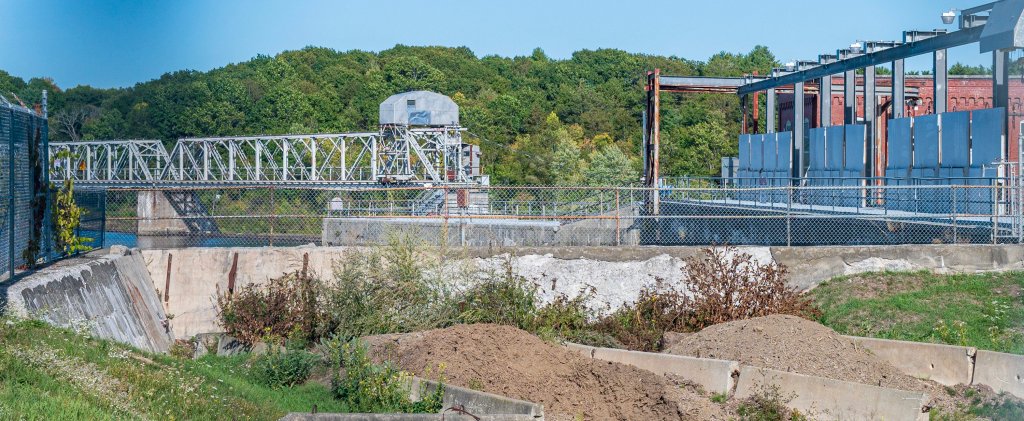

Brookfield White Pine Hydro, the owner of four dams on the lower Kennebec River, withdrew state-level applications for new water quality permits Thursday, saying new restrictions imposed by Maine regulators were too burdensome.
Brookfield recently agreed to sell the dams to The Nature Conservancy, which plans to restore “free-flowing” conditions to the lower Kennebec River through dam removal and other means.
The Maine Department of Environmental Protection issued a draft approval of the permits earlier this month, but required extensive fish passage and water quality improvements to Brookfield Renewable Energy’s plans to upgrade the four dams between Skowhegan and Waterville.
Brookfield’s New England compliance manager, Randall Dorman, said in a letter to the department Thursday those conditions were too restrictive.
He said mandates to build more fishways, increase fish passage minimums and other requirements “go far beyond any state goals described in current fishery management plans” and “lack sufficient technical justification and feasibility analysis.”
Environmental groups, meanwhile, said they found the restrictions didn’t go far enough and encouraged the state to deny the permits, instead of approving with extensive conditions.
The near-term future of the dams remains uncertain. Within the next year, Brookfield plans to transfer ownership of the four dams to The Nature Conservancy.
The Maine DEP certification was a final step in Brookfield’s permit renewal of the Shawmut dam in Fairfield — a process the energy giant began in 2020. The company also applied to amend its licenses for the three other dams to reflect the new fish passage plan.
Brookfield secured provisional approval from federal regulators earlier this year to renew the licenses but needed this state-level permit to complete the process.
Dorman wrote that Brookfield hopes to pause federal review of the four dam permits in light of Thursday’s withdrawal.
Dorman said in the letter that the complicated, expensive licensing process was a major influence for Brookfield to sell the dams and for withdrawing the application. And given The Nature Conservancy’s plans to remove the dams over the next decade, Dorman said, any proposal to enhance fish passage was moot.
Dorman also said the five-business-day timeline to respond to the restrictions was unfair.
“The timeline provided for review and comment on the draft (certification) is insufficient for BWPH and other stakeholders to conduct a thorough technical analysis and provide meaningful feedback,” Dorman said. “The draft is a complex, multi-faceted document—which took the Department the greater part of 11 months to develop—with significant implications for project operations, compliance, and environmental outcomes.”
The draft approval, which used input from the Maine Department of Marine Resources, placed stringent minimum requirements to allow native fish to pass easily through the dams.
For example, the draft approval required a 97% pass-through success rate for endangered Atlantic salmon within 48 hours of their approach to any of the dams. Department staff found Brookfield’s proposed fish lifts at each dam didn’t meet that standard and caused salmon to expend too much energy, or die.
Dorman said the state’s requirements were unobtainable, both ecologically and financially. Brookfield’s initial proposal to improve fish passage would have cost the company about $100 million, a 2023 study found.
If the state imposed the same requirements elsewhere, Dorman said it could “threaten the continued operation” of Brookfield’s other dams across the state. Brookfield produces almost 90% of Maine’s hydropower, and their four dams on the lower Kennebec River produce about 47 megawatts of the 615 megawatts the company generates.
“We encourage the Department to develop future (certifications), which are technically sound, feasible and consistent with both environmental protection and Maine’s clean energy, security and decarbonization goals,” Dorman said.
Environmental groups opposed to the dams’ continued operation, called the Kennebec Coalition, submitted a 33-page rebuttal to the state’s approval Thursday evening, before learning Brookfield had withdrawn its application.
In the testimony, the groups said there was no evidence that increasing the number of fishways would sufficiently improve upstream populations.
“Although we support certain aspects of the Draft Decision, we firmly maintain that the Lower Kennebec Dams and their discharges, as proposed in these applications, will cause or contribute to the failure of the Kennebec River to meet applicable Maine water quality standards,” the groups told state regulators. “Brookfield has not met its burden to prove otherwise, and the conditions imposed by DEP in the Draft Decision, while beneficial, do not alter this conclusion.”
Brookfield has battled with state regulators over the dams’ water quality permits before. The Maine DEP has denied the certifications twice — first in 2021, and again in 2022.
The 2021 rejection caused political uproar because of potential implications to the Sappi Somerset Mill in Skowhegan. The mill, which employs about 750 people, uses the dam’s small impoundment to collect millions of gallons of water daily for processing, cooling and fire protection.
Gov. Janet Mills, then in the midst of a reelection campaign, promised that “the mill isn’t going anywhere” in a Morning Sentinel op-ed.
A spokesperson for Mills also said after the announcement of the sale of the dams — a move that puts the mill’s water intake system in limbo — that the governor would “not support any action that would result in the closure of the mill.”
The Nature Conservancy has said it is “100% committed” to finding a solution that results in both restoration of free-flowing conditions on the river and the continued operation of the mill, but no such agreement has been made yet.
